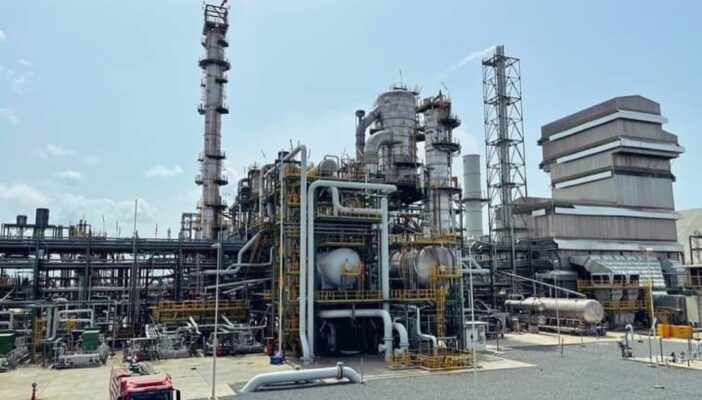
The Organisation of Petroleum Exporting Countries (OPEC) has highlighted that the supplies from Nigeria’s Dangote Refinery and Petrochemicals, the world’s largest single-train refinery, are poised to put significant pressure on Europe’s oil industry, particularly affecting the Northwest Europe Gasoil market. According to OPEC’s June 2024 Oil Market Report, the refinery is listed among the top suppliers of diesel and jet fuel that could disrupt Europe’s oil and gas industry, a shift that experts believe will have a positive impact on Nigeria’s economy.
Earlier reports by Standard & Poor Global, citing trading and ship tracking sources, had predicted that Nigeria’s $20 billion Dangote refinery would significantly alter global crude flows as it ramps up to full capacity. Since its operations commenced in January, the refinery has already started making waves in the international market, as confirmed by trading sources and tracking data.
OPEC’s report further noted that increased production levels from the Dangote refinery, combined with robust supply from the Middle East and new outputs from Mexico’s Olmeca refinery, are expected to exert pressure on the performance of Northwest Europe’s gasoil sector in the mid-term. The report also emphasized that Europe, as one of the largest consumers of refined petroleum products globally, had turned to imports from Asia and the US after the European Union banned Russian diesel.
The 650,000 barrels-per-day (bpd) refinery, owned by Africa’s richest man, Aliko Dangote, is now targeting the broader European market, following the halt of crude oil supplies by international oil companies. Devakumar Edwin, Vice President of Oil and Gas at Dangote Industries Limited, announced that the company had already exported its first jet fuel cargo to Europe as production quickly scales up.
The refinery reportedly exported 90% of its 3.5 billion litres of jet fuel and diesel to Europe due to a lack of support from the Nigerian government. Edwin stated, “It is good to note that from the start of production, more than 3.5 billion litres, which represents 90% of our production, have been exported.”
BP has begun transporting its first jet fuel cargo to Rotterdam from Dangote after securing a portion of a 120,000 metric tonnes tender for late May, according to S&P Global. OPEC also observed that the jet/kerosene crack spread in Rotterdam against Brent showed a slight decline in June, influenced by supply-side factors. Although there were signs of increasing air travel activities, the demand for jet fuel from the aviation sector remained subdued, affecting the product market. However, European jet/kerosene demand is anticipated to rise as aviation consumption levels continue to recover in the coming months.
S&P noted that in its first six months, Dangote Refinery scaled up to 400,000 bpd, supplying diesel, jet fuel, naphtha, and fuel oil to both domestic and export markets. The production of gasoline, Nigeria’s primary fuel type, is expected to begin in mid-August. Despite its short time in operation, the refinery has already impacted crude flows, with numerous Nigerian cargoes remaining in-country and the US WTI Midland, a comparable light, sweet grade, being imported.
This mega-refinery could tighten the market for light, sweet crude. A West African crude trader informed Commodity Insights, “Its diet is WTI and the lighter Nigerian [crudes], so if you were chasing those barrels, you’d probably feel it quite keenly.” The trader added that once the refinery reaches 650,000 bpd without any WTI Midland, the market could face severe disruptions.
Initially, WTI Midland crude emerged as the preferred feedstock to complement Nigerian supply, with the refinery signing long-term contracts for the US grade due to its competitive pricing. Platts, part of Commodity Insights, last assessed WTI Midland into Rotterdam at $82.36 per barrel on July 31, while Nigeria’s Bonny Light was assessed at $82.80 per barrel on the same day.
The crude flows associated with the Dangote refinery have had a notable impact on other markets, especially Europe, which is the largest consumer of light, sweet Nigerian crude. US-grade crude has accounted for 30% of the oil delivered to Dangote, transported through 18 cargoes. Aliko Dangote, President of the Dangote Group, mentioned that the facility plans to diversify its feedstock sources, incorporating crude from Libya, Angola, and Brazil.
“The refinery was built to utilize Nigerian crude and add value to it within Nigeria. Why should we deviate from that focus?” Dangote said, adding that while crude supply issues are “getting resolved,” the refinery remains open to all opportunities to supplement its feedstock. Rasool Barouni, Associate Director and Head of Refining at S&P Global Commodity Insights, affirmed, “Dangote refinery is designed to process a range of light and medium grades of crude oil, including Nigerian grades. Other similar grades, including other West African grades, could be an option.”
Nigeria, which is sub-Saharan Africa’s largest oil producer, pumped 1.5 million barrels per day in June, as per the Platts OPEC Survey from S&P Global Commodity Insights. Historically, all of Nigeria’s oil was exported due to the country’s lack of refining capacity, leading to the importation of gasoline, diesel, and jet fuel for domestic use.
Join our WhatsApp channel for more updates.